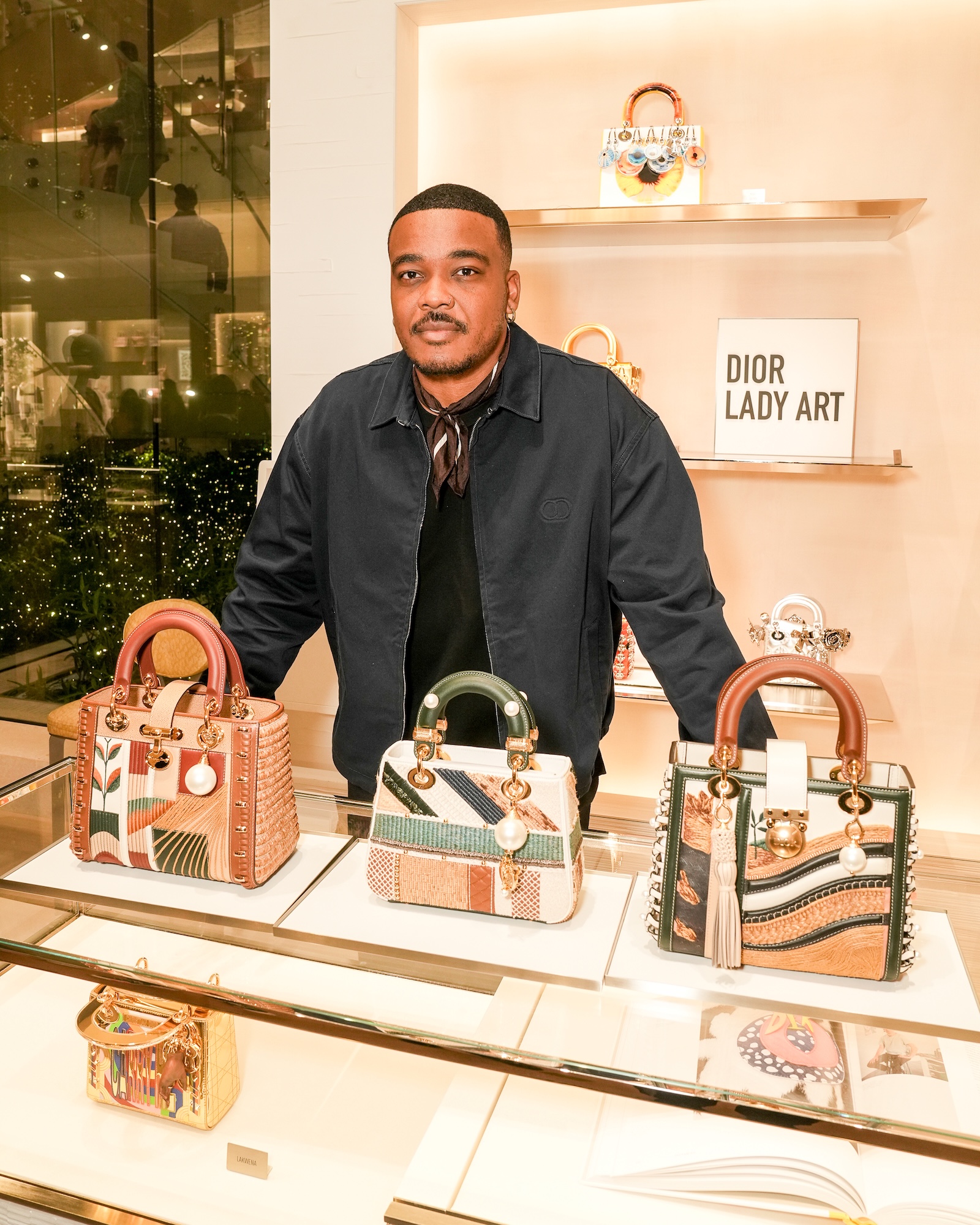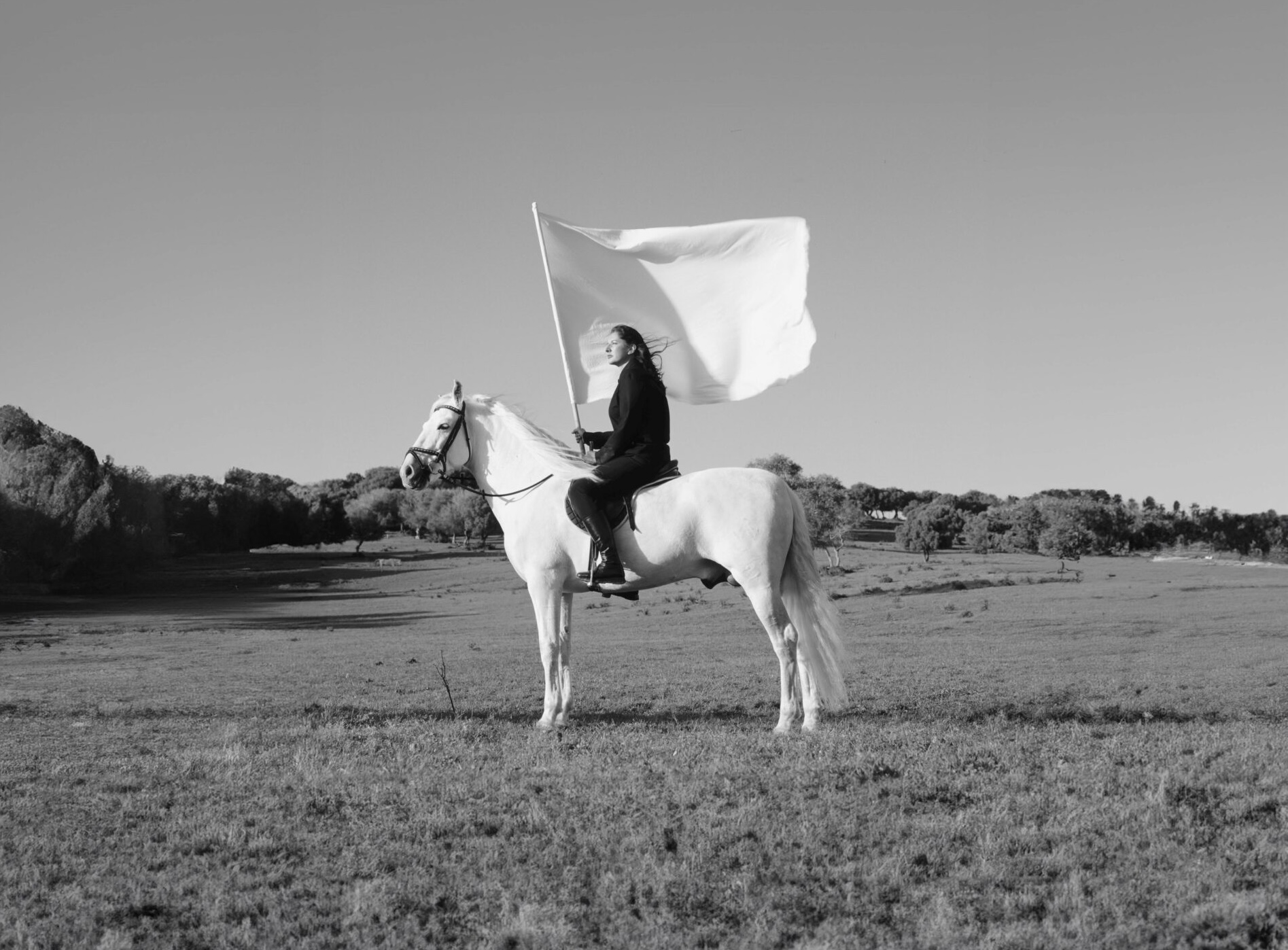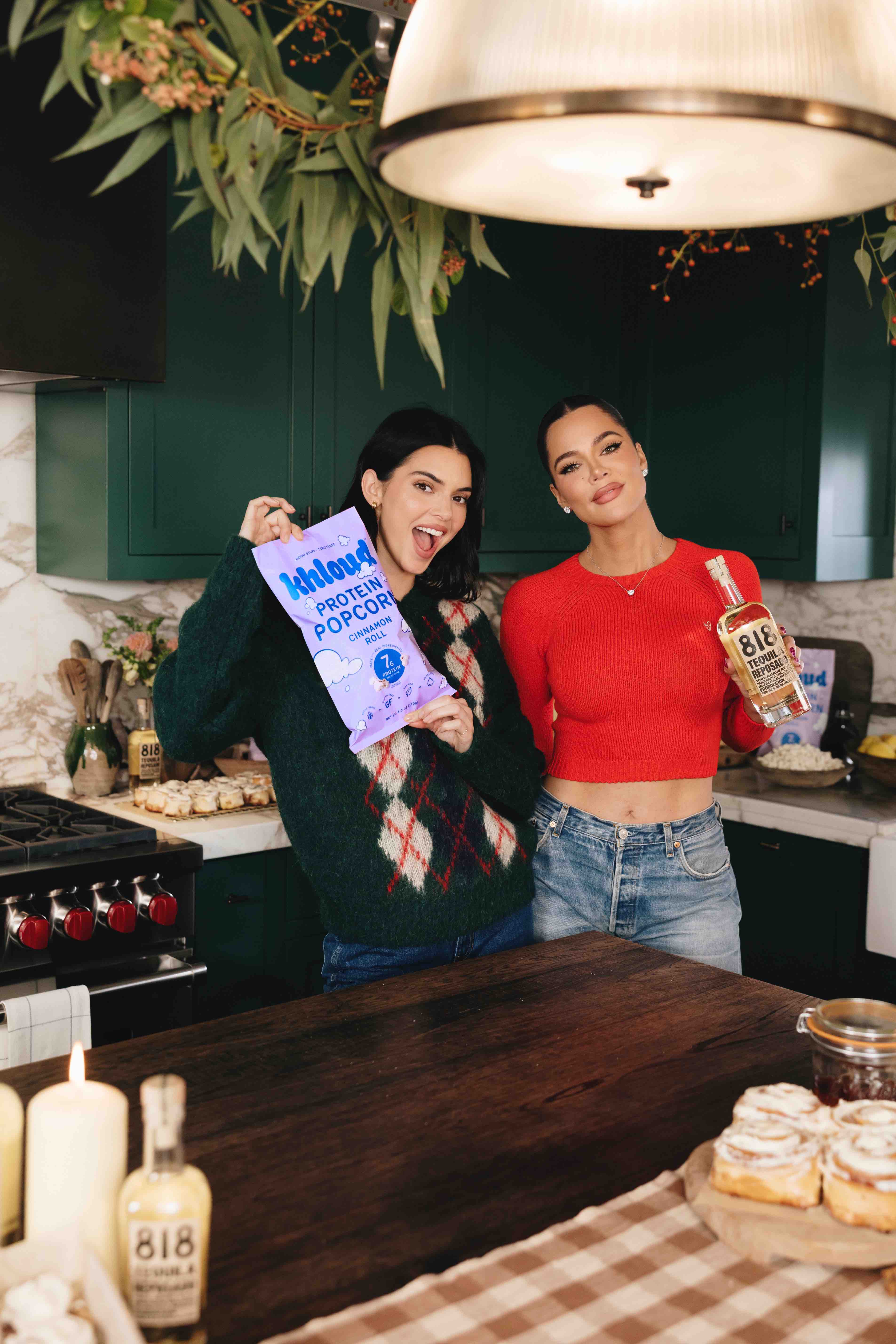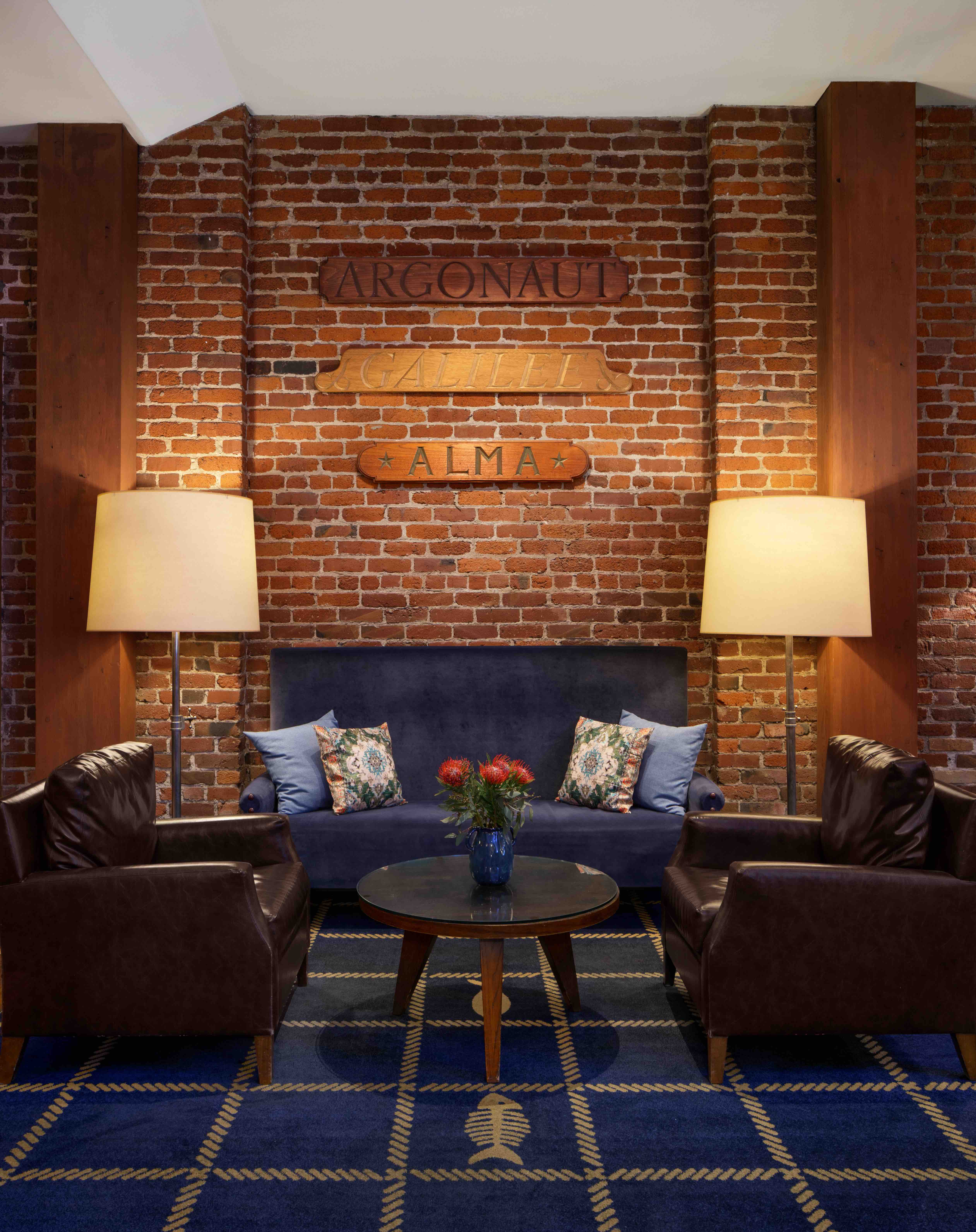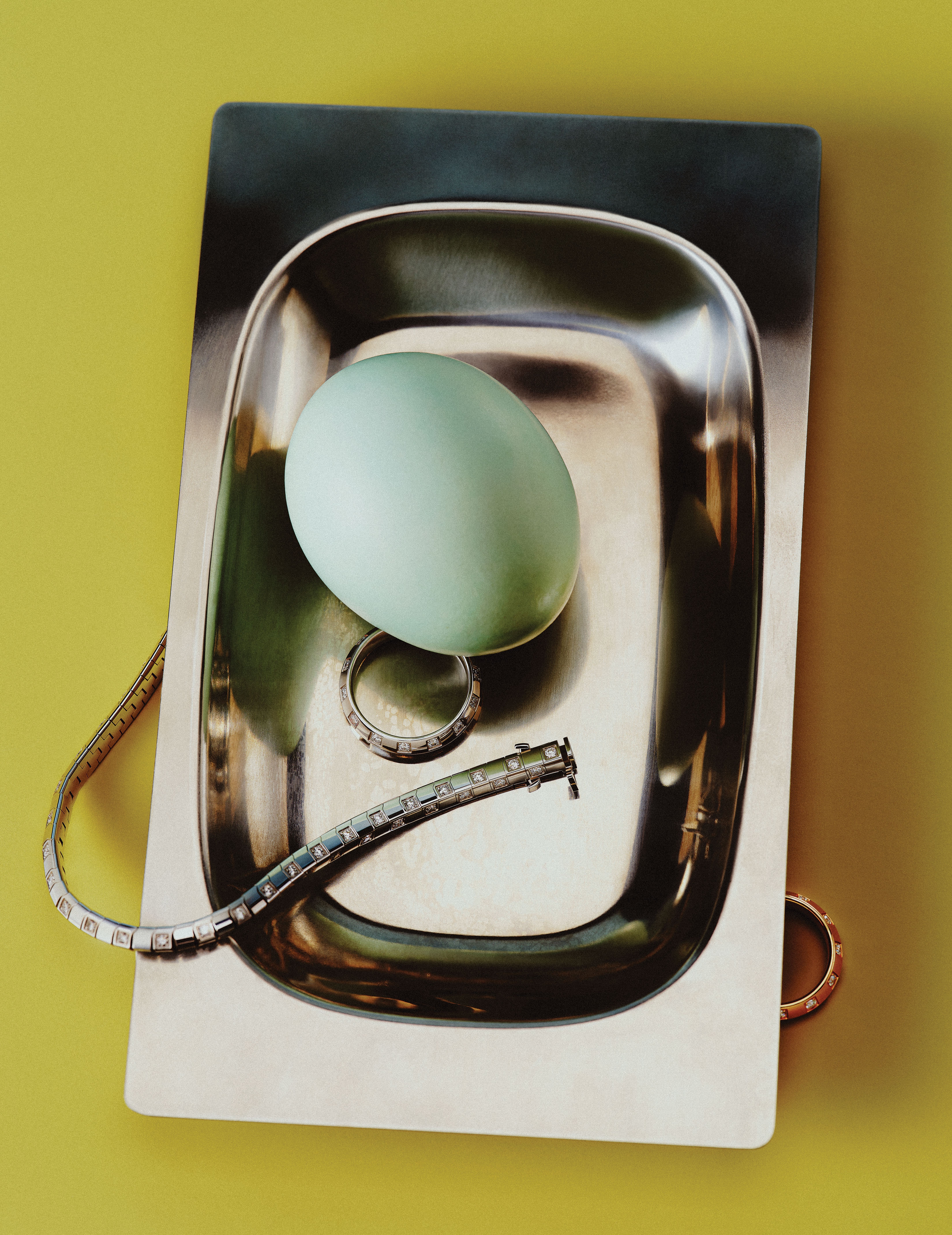

_Photographed by_ Fabian Guerro
In their first collaborative album, song-writer Rush Davis and DJ Kingdom have come together to create _Transmission_, a pulsating and atmospheric amalgamation of R&B and electronic soundscapes.
While Rush and Kingdom have known each other for quite some time and have worked together on past projects, this is the first time the two are coming together to collaborate on a full body of work. The two artists have both distinguished themselves as forces to be reckoned with through years of both solo and collaborative projects. Kingdom, the cofounder of the Fade to Mind label, is an internationally touring DJ who has produced for artists like SZA, Kelela, and Syd. Rush Davis is a genre-defying singer-songwriter, working with hip hop, pop, R&B, and electronic artists, such as Duke Dumont, Dawn Richard, and Scarface.
_Transmission_ is dedicated to Mustache Monday’s, an iconic LGBTQ party hosted in LA by the late Nacho Nava where both Rush and Kingdom would let loose and find inspiration. In fact, it was there that Rush and Kingdom first met in 2013. After Nacho’s passing in 2019, Mustache Monday’s was discontinued, unable to go on without the orchestrator behind the whole party.
While the lyrics are explicitly queer-coded, and the album as a whole celebrates queer culture, the songs speak to listeners in a way that transcends sexuality and personal experience; anyone can find meaning in the lyrics or connect with the entrancing rhythm of each song. Fusing UK-influenced heavy bass production with 2000’s inspired R&B sounds, _Transmission_ is the perfect meeting of both artist’s strengths. It’s an example of the kind of artistry that comes from two powerhouse musicians joining forces to create something new, in all senses of the word.


_Photographed by_ Gabriel Perez Silva
**I read that you two met at Mustache Mondays. What do you remember about that night?**
**Rush**: Mustache had a killer line up one night, I think it was Brenmar, Josh Peace, Kingdom, and Total Freedom. I went to Mustache that night with Prince Will from Fade to Mind. I was just featured on this Brenmar song called “Medusa” and Will heard it and thought it would be a good idea for us to write together over some Fade to Mind production. He introduced me to Kingdom that night outside of Mustache. Fast forward, Will introduced me to Kelela. Kelela was working on “Cut 4 Me” at the time and was recording final vocals for the album. So I met her at her apartment, ate an edible, sang adlibs for hours with her to “Send Me Out.” That night, I went with her to the studio as she finished recording. I was high out of my mind on said edible asleep on a couch. No help at all. That was technically my first time in the studio with Kingdom.
**Kingdom**: La Cita was like, it was at many venues, but La Cita was the spot that everyone remembers it at. Where I think the best dancing went down. And I had heard about Rush through my friend Will, and that he was an amazing writer, an amazing singer. And I feel like there were a lot of brief interactions in the club, which—the club was always chaotic. And you know, all the interactions are often short at the club because you're really just trying to get your drink and trying to go dance basically. Or it's loud, and you're not hearing people. But what was the first time that we were in a non-club setting?
**Rush**: Well, actually with Kelela.
**Kingdom**: Okay, see his memory is better than mine, mine’s shot, so.
**Rush**: One day Kelela hit me up and was like, ‘Hey, I'm finishing some records on my album,’ and if I wanted to come with her to the studio. So we ate a couple edibles, we went to the studio, and I was like super zonked out on an edible.
**So it was less of a one night interaction, more of like a series of nights.**
**Rush**: Exactly, but this has been ongoing for years. And then I would go and write with Will a lot and Asma. And then I pop up in the studio every now and again, and I don't think—I think the first thing we worked on together was Dawn.
**Kingdom**: Was Dawn before Semma, yeah?
**Rush**: Yeah, the Dawn project.
**Kingdom**: Yeah, I guess the project we did with Dawn Richard for Fade to Mind was the first thing. And \[Rush\] co-wrote all those songs with Dawn Richard and Prince Will and Asma, and I made all the beats on that project. So that was like the first time of us formally coming together, you know?
**And this is the first time that you've done a full album with each other, right?**
**Kingdom**: Yes. It makes sense that the story is more sprinkled in because we are part of this like broader, looser community. So it's not like we're coming from different worlds and have such an intense meet up. It's more like, ‘Oh, I saw him there and then I heard of him there.’ It builds up in that way.
**Rush**: You know, it's a long web, like years of webs between the two of us.
**For you Kingdom, what was the inspiration behind the sounds that you used in the production? And for Rush, where do you draw inspiration for your writing?**
**Kingdom**: For me? Places like Mustache are the inspiration because it's such a multi-genre—different communities coming together, different races, different sexual orientations. And my label and the parties we've done have always been that way too. And my label is part of the Mustache scene. So it's really about bringing club energy into R&B and vice versa. And, you know, drawing upon heavy bass sounds as well as really ethereal sort of emotional sounds. That's kind of always the way I operate. And for this project, I co-produced some of those songs as well with other producers.
So I think they sometimes brought a little bit of Rush’s sensibility into it in a way because I'm not trained at all. So I guess with chord changes and that's what gives the songs and a weirder feel maybe. But then some of the songs, we had someone else do the chords, so they bring that proper structure of the chord changes, which I love. And that kind of bridges the gap a little bit.
**Rush**: Yeah. I mean, for me, it's really just—there's two different ways I can write. Either I can be extremely methodical about it, which I hate, or it just kind of downloads and all the melodies, the lyrics, and all of it kind of comes at the same time for me. And for me, the choices of every track were the records coming to me that way. If I had to sit with it too long, or if I had to really think about what I was going to say, then I didn't move with it. But literally every song that is on the album came to me super quick.
So for me, if it's like that sort of emotional charge behind it, where the context of the record, everything is lined up, then that's how I move. And that's part of the reason why it's called transmission as well as, because it's like, it's channelled, it just comes straight down.
**Kingdom**: Are there any life themes that inspired the lyrical content?
**Rush**: Oh, 1000%. The thing is… I hate to toot my own horn, but I can write about anything. To me, words aren't hard. It's more finding where, the words, the melody, the production and everything marries to where you don't just have a good song on top of a good beat, but you have the record, you know what I mean?
So it sounds like no matter who would do another record on top of it, it's like, no, that's that song. You know what I mean? So ultimately it's like, I do need a thread of a concept to move with. And a lot of times the concept will come to me in a title, or it'll come to me in just the mood of the song, and it'll remind me of something. Like for instance, on “Daddy”, we were having a conversation about it. And I was like, ‘okay, this song is going to be about that.’
**Kingdom**: Yeah. So “Daddy” is about… I had a quarantine romance that ended very abruptly. So Rush was the shoulder that I cried on the moment that went down. So we immediately channeled that into a song. And even when I hear it to this day, I'm kind of annoyingly taken back to that day, you know? It’s that charged into it. But the other ones I think were inspired by Rush’s own romantic ups and downs, changes.
**Rush**: And also like community themes too, like certain things that I want us to remember. For instance, with “Nerve,” we were reminded that it takes courage to connect, you know? And I think what's happened over quarantine is people are more and more afraid of connecting, especially with new connections or hard connections that may have failed. You know, just the courage to step back into those relationships. So there's those sort of things in there as well, but also my own love stories, like “Moral High Ground,” which is messy as hell.
It's like stepping into an open relationship with a couple, you know? And falling in love with one of them. You know, that type of drama that we would get sometimes at Mustache, because there's a lot of different energies that float around in that space. So you can find yourself in any sort of relationship from Monday to Monday.
**Kingdom**: But the topics really are different than a lot of R&B influenced albums in the sense that most of them do only cover love and relationships. We have “Be Confident,” which is about self-empowerment. “Bad Side” is more like a ‘don't fuck with me’ theme. So there is more than just romance on it, which is actually hard to find in the R&B world, you know?
**Anybody can relate to these lyrics and connect with this sound. But I do think that some of the themes in the lyrics are specifically meant for queer audiences. What do you think the importance is of making music by the community and for the community?**
Kingdom: Yeah, I think it's really important. There are so few examples of it, and I respect any gay artists with the way they want to do it, but I think it's cool that the way we did it is like…
Rush: Explicit.
Kingdom: It’s explicit, but it's also not in an identity centered way where it's just about gay, gay, gay. Like it's woven in in a subtle way. We're not pandering to a specific audience, even though it can speak to them. And our beats also aren't what you expect from a gay album, you know.
**Rush**: I just think it's important to have different types of representation. I think what we represent is, in a lot of ways, the true other. We don't necessarily fit into these different boxes, especially when it comes to music. And I think it's really cool to just have queer artists that sound different and that are speaking about things in a totally different way.
**How does this album, both the lyrics and the production, kind of encapsulate this feeling of freedom and of just complete acceptance?**
**Kingdom**: I think it's the diversity of the approach. I think it's just the sound of Mustache, with all the mixed genres. I think that kind of relates to how it's a Mustache related project. That's where the freedom comes from is the genre-lessness and... also just Rush’s tone and mood on the album is very welcoming and very inclusive. So I think that helps a lot too.
**Rush**: Yeah. I think it's like still like a masculine voice, but at the same time, my delivery is very soft. I think that's a part of it. But also, I feel like Kingdom nailed it on the head when he said it's just the mixing of all these different genres. I think one thing that all of us have in common is that we were definitely into the B songs. You know what I mean? Like the deep cuts on the records, especially from artists like Kelis and, you know, The Neptunes, and just those obscure sounds that blended things.
**Why do you think it is that R&B and electronic music mesh so well together?**
**Kingdom**: I mean, I feel like R&B has always flirted with it, like ever since the production went that direction. I mean, even in the eighties, R&B artists were doing these more dance sort of freestyle sounding records. So I think it's just electronic beats sound better over a club's speaker. It just can come through louder than a live drum in a way, and cleaner. And you know, also accessibility, like it can be homemade in that way because you don't have a whole band to work with.
You can produce it yourself in your bedroom. I'm not going to speak for Black producers, but from what I know, a lot of techno and all the origins of electronic music, also comes from necessity. Like we found one keyboard at a thrift store, and we just recorded that. And so there's a simplicity to it in a way too.
**Rush**: And also like, if you think about the history of music where you had these R&B records that would be straight up and down R&B, but in order for them to reach the world, they would need a remix, you know? And now—and I love it—now we understand that DJs are artists as well.
They're not just people that just come in and produce and play the party. They have a real perspective, a real identity and a real atmosphere about how they bring their creativity to us. That when we bring our songs to them, it's like it takes it in a completely different world and it opens it up to people that it may not have reached otherwise. So I think now it's more— I think we realize that the music that's produced with R&B and dance producers, it should be the original record instead of the remix, you know what I mean?
Kingdom: We're remixing before it gets remixed, basically.
**For Mustache Mondays, because this is an album dedicated to Mustache Mondays. What did that experience mean to you guys? Professionally, but also personally.**
**Kingdom**: Well, Mustache was the first gig—I was already DJ-ing a lot in New York. But I hadn't left the east coast yet until Nacho booked me. So that was my first time getting on a plane and going somewhere to DJ. So it was a huge experience. And that's where I met a lot of my closest friends when I came out here, I started to bond with them and fall in love with California.
And so it's just such a new chapter that he opened, and he did that for so many people. So he changed my career forever in that way. And he continued to book me after that as well. And then, you know, to play an event this special changed my perspective on what an event could be. Just all the friendships and how personal it felt to be there, it didn't feel like just a gig job. And then musically, like we said, playing there, you hear songs you can’t hear elsewhere. You know, Total Freedom is one of the resident DJs, so you'll hear Total Freedom play an edit that he made that no one has. So you know, music that's not something you can consume elsewhere. So it just influenced my sound a lot to experience the music there. And you know, Nacho also added a lot of drag and performance art things that you never see at clubs—maybe more now, but definitely not back then.
**Rush**: Definitely not back then.
**Kingdom**: So again, broadening my idea of— and maybe I was like a little shy around those things, or I didn't have experienced yet as a young gay, so like getting comfortable with and trying to understand crazy performance art and drag, that's a very new experience and influential.
**And for you, Rush?**
**Rush**: For me, Nacho was like another father figure for me. And sitting across from him and watching him put nights together, the way he would curate, and the things that he was into and the things he wasn't into, and why? The why's were like... it was a wealth of knowledge in terms of nuance and understanding how to play with things in ways that I would've never had, you know? Because for me, where I come from, it's all about trendy. Like, what's trendy, what's hot, you know? And with him, it was always things that were overlooked. It was the sides and the edges—
**Kingdom**: The underdogs, yeah.
**Rush**: And it was like, how do you put the right light on these different things to make them, you know, amplify? And it changed— I applied that same logic to songwriting and so many different things, because it's one of those lenses that translate into so many different places.
And also just watching him move and being in that space around so many other creative friends. Like one of my closest friends is Frank Fernandez, an incredible creative director who helped us visualize some of this stuff as well. He used to do the flyers for Mustache, and ended up doing the meat dress for Lady Gaga and so many different things where like... just watching him work and learning, you know, ‘Okay, now I see how you can put this texture with this texture, and it doesn't have to match by color,’ you know? And applying that lens to music. It's like, it changed everything for me. And for that reason, this being like one of the first albums that I'm really standing behind with Kingdom here, it means so much. And I wanted to dedicate it to that because this meeting would have never even happened if it wasn't for Mustache. Us connecting wouldn’t have happened.
 
_Photographed by_ Fabian Guerro
In their first collaborative album, song-writer Rush Davis and DJ Kingdom have come together to create _Transmission_, a pulsating and atmospheric amalgamation of R&B and electronic soundscapes.
While Rush and Kingdom have known each other for quite some time and have worked together on past projects, this is the first time the two are coming together to collaborate on a full body of work. The two artists have both distinguished themselves as forces to be reckoned with through years of both solo and collaborative projects. Kingdom, the cofounder of the Fade to Mind label, is an internationally touring DJ who has produced for artists like SZA, Kelela, and Syd. Rush Davis is a genre-defying singer-songwriter, working with hip hop, pop, R&B, and electronic artists, such as Duke Dumont, Dawn Richard, and Scarface.
_Transmission_ is dedicated to Mustache Monday’s, an iconic LGBTQ party hosted in LA by the late Nacho Nava where both Rush and Kingdom would let loose and find inspiration. In fact, it was there that Rush and Kingdom first met in 2013. After Nacho’s passing in 2019, Mustache Monday’s was discontinued, unable to go on without the orchestrator behind the whole party.
While the lyrics are explicitly queer-coded, and the album as a whole celebrates queer culture, the songs speak to listeners in a way that transcends sexuality and personal experience; anyone can find meaning in the lyrics or connect with the entrancing rhythm of each song. Fusing UK-influenced heavy bass production with 2000’s inspired R&B sounds, _Transmission_ is the perfect meeting of both artist’s strengths. It’s an example of the kind of artistry that comes from two powerhouse musicians joining forces to create something new, in all senses of the word.

_Photographed by_ Fabian Guerro
In their first collaborative album, song-writer Rush Davis and DJ Kingdom have come together to create _Transmission_, a pulsating and atmospheric amalgamation of R&B and electronic soundscapes.
While Rush and Kingdom have known each other for quite some time and have worked together on past projects, this is the first time the two are coming together to collaborate on a full body of work. The two artists have both distinguished themselves as forces to be reckoned with through years of both solo and collaborative projects. Kingdom, the cofounder of the Fade to Mind label, is an internationally touring DJ who has produced for artists like SZA, Kelela, and Syd. Rush Davis is a genre-defying singer-songwriter, working with hip hop, pop, R&B, and electronic artists, such as Duke Dumont, Dawn Richard, and Scarface.
_Transmission_ is dedicated to Mustache Monday’s, an iconic LGBTQ party hosted in LA by the late Nacho Nava where both Rush and Kingdom would let loose and find inspiration. In fact, it was there that Rush and Kingdom first met in 2013. After Nacho’s passing in 2019, Mustache Monday’s was discontinued, unable to go on without the orchestrator behind the whole party.
While the lyrics are explicitly queer-coded, and the album as a whole celebrates queer culture, the songs speak to listeners in a way that transcends sexuality and personal experience; anyone can find meaning in the lyrics or connect with the entrancing rhythm of each song. Fusing UK-influenced heavy bass production with 2000’s inspired R&B sounds, _Transmission_ is the perfect meeting of both artist’s strengths. It’s an example of the kind of artistry that comes from two powerhouse musicians joining forces to create something new, in all senses of the word.
 
_Photographed by_ Gabriel Perez Silva
**I read that you two met at Mustache Mondays. What do you remember about that night?**
**Rush**: Mustache had a killer line up one night, I think it was Brenmar, Josh Peace, Kingdom, and Total Freedom. I went to Mustache that night with Prince Will from Fade to Mind. I was just featured on this Brenmar song called “Medusa” and Will heard it and thought it would be a good idea for us to write together over some Fade to Mind production. He introduced me to Kingdom that night outside of Mustache. Fast forward, Will introduced me to Kelela. Kelela was working on “Cut 4 Me” at the time and was recording final vocals for the album. So I met her at her apartment, ate an edible, sang adlibs for hours with her to “Send Me Out.” That night, I went with her to the studio as she finished recording. I was high out of my mind on said edible asleep on a couch. No help at all. That was technically my first time in the studio with Kingdom.
**Kingdom**: La Cita was like, it was at many venues, but La Cita was the spot that everyone remembers it at. Where I think the best dancing went down. And I had heard about Rush through my friend Will, and that he was an amazing writer, an amazing singer. And I feel like there were a lot of brief interactions in the club, which—the club was always chaotic. And you know, all the interactions are often short at the club because you're really just trying to get your drink and trying to go dance basically. Or it's loud, and you're not hearing people. But what was the first time that we were in a non-club setting?
**Rush**: Well, actually with Kelela.
**Kingdom**: Okay, see his memory is better than mine, mine’s shot, so.
**Rush**: One day Kelela hit me up and was like, ‘Hey, I'm finishing some records on my album,’ and if I wanted to come with her to the studio. So we ate a couple edibles, we went to the studio, and I was like super zonked out on an edible.
**So it was less of a one night interaction, more of like a series of nights.**
**Rush**: Exactly, but this has been ongoing for years. And then I would go and write with Will a lot and Asma. And then I pop up in the studio every now and again, and I don't think—I think the first thing we worked on together was Dawn.
**Kingdom**: Was Dawn before Semma, yeah?
**Rush**: Yeah, the Dawn project.
**Kingdom**: Yeah, I guess the project we did with Dawn Richard for Fade to Mind was the first thing. And \[Rush\] co-wrote all those songs with Dawn Richard and Prince Will and Asma, and I made all the beats on that project. So that was like the first time of us formally coming together, you know?
**And this is the first time that you've done a full album with each other, right?**
**Kingdom**: Yes. It makes sense that the story is more sprinkled in because we are part of this like broader, looser community. So it's not like we're coming from different worlds and have such an intense meet up. It's more like, ‘Oh, I saw him there and then I heard of him there.’ It builds up in that way.
**Rush**: You know, it's a long web, like years of webs between the two of us.
**For you Kingdom, what was the inspiration behind the sounds that you used in the production? And for Rush, where do you draw inspiration for your writing?**
**Kingdom**: For me? Places like Mustache are the inspiration because it's such a multi-genre—different communities coming together, different races, different sexual orientations. And my label and the parties we've done have always been that way too. And my label is part of the Mustache scene. So it's really about bringing club energy into R&B and vice versa. And, you know, drawing upon heavy bass sounds as well as really ethereal sort of emotional sounds. That's kind of always the way I operate. And for this project, I co-produced some of those songs as well with other producers.
So I think they sometimes brought a little bit of Rush’s sensibility into it in a way because I'm not trained at all. So I guess with chord changes and that's what gives the songs and a weirder feel maybe. But then some of the songs, we had someone else do the chords, so they bring that proper structure of the chord changes, which I love. And that kind of bridges the gap a little bit.
**Rush**: Yeah. I mean, for me, it's really just—there's two different ways I can write. Either I can be extremely methodical about it, which I hate, or it just kind of downloads and all the melodies, the lyrics, and all of it kind of comes at the same time for me. And for me, the choices of every track were the records coming to me that way. If I had to sit with it too long, or if I had to really think about what I was going to say, then I didn't move with it. But literally every song that is on the album came to me super quick.
So for me, if it's like that sort of emotional charge behind it, where the context of the record, everything is lined up, then that's how I move. And that's part of the reason why it's called transmission as well as, because it's like, it's channelled, it just comes straight down.
**Kingdom**: Are there any life themes that inspired the lyrical content?
**Rush**: Oh, 1000%. The thing is… I hate to toot my own horn, but I can write about anything. To me, words aren't hard. It's more finding where, the words, the melody, the production and everything marries to where you don't just have a good song on top of a good beat, but you have the record, you know what I mean?
So it sounds like no matter who would do another record on top of it, it's like, no, that's that song. You know what I mean? So ultimately it's like, I do need a thread of a concept to move with. And a lot of times the concept will come to me in a title, or it'll come to me in just the mood of the song, and it'll remind me of something. Like for instance, on “Daddy”, we were having a conversation about it. And I was like, ‘okay, this song is going to be about that.’
**Kingdom**: Yeah. So “Daddy” is about… I had a quarantine romance that ended very abruptly. So Rush was the shoulder that I cried on the moment that went down. So we immediately channeled that into a song. And even when I hear it to this day, I'm kind of annoyingly taken back to that day, you know? It’s that charged into it. But the other ones I think were inspired by Rush’s own romantic ups and downs, changes.
**Rush**: And also like community themes too, like certain things that I want us to remember. For instance, with “Nerve,” we were reminded that it takes courage to connect, you know? And I think what's happened over quarantine is people are more and more afraid of connecting, especially with new connections or hard connections that may have failed. You know, just the courage to step back into those relationships. So there's those sort of things in there as well, but also my own love stories, like “Moral High Ground,” which is messy as hell.
It's like stepping into an open relationship with a couple, you know? And falling in love with one of them. You know, that type of drama that we would get sometimes at Mustache, because there's a lot of different energies that float around in that space. So you can find yourself in any sort of relationship from Monday to Monday.
**Kingdom**: But the topics really are different than a lot of R&B influenced albums in the sense that most of them do only cover love and relationships. We have “Be Confident,” which is about self-empowerment. “Bad Side” is more like a ‘don't fuck with me’ theme. So there is more than just romance on it, which is actually hard to find in the R&B world, you know?
**Anybody can relate to these lyrics and connect with this sound. But I do think that some of the themes in the lyrics are specifically meant for queer audiences. What do you think the importance is of making music by the community and for the community?**
Kingdom: Yeah, I think it's really important. There are so few examples of it, and I respect any gay artists with the way they want to do it, but I think it's cool that the way we did it is like…
Rush: Explicit.
Kingdom: It’s explicit, but it's also not in an identity centered way where it's just about gay, gay, gay. Like it's woven in in a subtle way. We're not pandering to a specific audience, even though it can speak to them. And our beats also aren't what you expect from a gay album, you know.
**Rush**: I just think it's important to have different types of representation. I think what we represent is, in a lot of ways, the true other. We don't necessarily fit into these different boxes, especially when it comes to music. And I think it's really cool to just have queer artists that sound different and that are speaking about things in a totally different way.
**How does this album, both the lyrics and the production, kind of encapsulate this feeling of freedom and of just complete acceptance?**
**Kingdom**: I think it's the diversity of the approach. I think it's just the sound of Mustache, with all the mixed genres. I think that kind of relates to how it's a Mustache related project. That's where the freedom comes from is the genre-lessness and... also just Rush’s tone and mood on the album is very welcoming and very inclusive. So I think that helps a lot too.
**Rush**: Yeah. I think it's like still like a masculine voice, but at the same time, my delivery is very soft. I think that's a part of it. But also, I feel like Kingdom nailed it on the head when he said it's just the mixing of all these different genres. I think one thing that all of us have in common is that we were definitely into the B songs. You know what I mean? Like the deep cuts on the records, especially from artists like Kelis and, you know, The Neptunes, and just those obscure sounds that blended things.
**Why do you think it is that R&B and electronic music mesh so well together?**
**Kingdom**: I mean, I feel like R&B has always flirted with it, like ever since the production went that direction. I mean, even in the eighties, R&B artists were doing these more dance sort of freestyle sounding records. So I think it's just electronic beats sound better over a club's speaker. It just can come through louder than a live drum in a way, and cleaner. And you know, also accessibility, like it can be homemade in that way because you don't have a whole band to work with.
You can produce it yourself in your bedroom. I'm not going to speak for Black producers, but from what I know, a lot of techno and all the origins of electronic music, also comes from necessity. Like we found one keyboard at a thrift store, and we just recorded that. And so there's a simplicity to it in a way too.
**Rush**: And also like, if you think about the history of music where you had these R&B records that would be straight up and down R&B, but in order for them to reach the world, they would need a remix, you know? And now—and I love it—now we understand that DJs are artists as well.
They're not just people that just come in and produce and play the party. They have a real perspective, a real identity and a real atmosphere about how they bring their creativity to us. That when we bring our songs to them, it's like it takes it in a completely different world and it opens it up to people that it may not have reached otherwise. So I think now it's more— I think we realize that the music that's produced with R&B and dance producers, it should be the original record instead of the remix, you know what I mean?
Kingdom: We're remixing before it gets remixed, basically.
**For Mustache Mondays, because this is an album dedicated to Mustache Mondays. What did that experience mean to you guys? Professionally, but also personally.**
**Kingdom**: Well, Mustache was the first gig—I was already DJ-ing a lot in New York. But I hadn't left the east coast yet until Nacho booked me. So that was my first time getting on a plane and going somewhere to DJ. So it was a huge experience. And that's where I met a lot of my closest friends when I came out here, I started to bond with them and fall in love with California.
And so it's just such a new chapter that he opened, and he did that for so many people. So he changed my career forever in that way. And he continued to book me after that as well. And then, you know, to play an event this special changed my perspective on what an event could be. Just all the friendships and how personal it felt to be there, it didn't feel like just a gig job. And then musically, like we said, playing there, you hear songs you can’t hear elsewhere. You know, Total Freedom is one of the resident DJs, so you'll hear Total Freedom play an edit that he made that no one has. So you know, music that's not something you can consume elsewhere. So it just influenced my sound a lot to experience the music there. And you know, Nacho also added a lot of drag and performance art things that you never see at clubs—maybe more now, but definitely not back then.
**Rush**: Definitely not back then.
**Kingdom**: So again, broadening my idea of— and maybe I was like a little shy around those things, or I didn't have experienced yet as a young gay, so like getting comfortable with and trying to understand crazy performance art and drag, that's a very new experience and influential.
**And for you, Rush?**
**Rush**: For me, Nacho was like another father figure for me. And sitting across from him and watching him put nights together, the way he would curate, and the things that he was into and the things he wasn't into, and why? The why's were like... it was a wealth of knowledge in terms of nuance and understanding how to play with things in ways that I would've never had, you know? Because for me, where I come from, it's all about trendy. Like, what's trendy, what's hot, you know? And with him, it was always things that were overlooked. It was the sides and the edges—
**Kingdom**: The underdogs, yeah.
**Rush**: And it was like, how do you put the right light on these different things to make them, you know, amplify? And it changed— I applied that same logic to songwriting and so many different things, because it's one of those lenses that translate into so many different places.
And also just watching him move and being in that space around so many other creative friends. Like one of my closest friends is Frank Fernandez, an incredible creative director who helped us visualize some of this stuff as well. He used to do the flyers for Mustache, and ended up doing the meat dress for Lady Gaga and so many different things where like... just watching him work and learning, you know, ‘Okay, now I see how you can put this texture with this texture, and it doesn't have to match by color,’ you know? And applying that lens to music. It's like, it changed everything for me. And for that reason, this being like one of the first albums that I'm really standing behind with Kingdom here, it means so much. And I wanted to dedicate it to that because this meeting would have never even happened if it wasn't for Mustache. Us connecting wouldn’t have happened.

_Photographed by_ Gabriel Perez Silva
**I read that you two met at Mustache Mondays. What do you remember about that night?**
**Rush**: Mustache had a killer line up one night, I think it was Brenmar, Josh Peace, Kingdom, and Total Freedom. I went to Mustache that night with Prince Will from Fade to Mind. I was just featured on this Brenmar song called “Medusa” and Will heard it and thought it would be a good idea for us to write together over some Fade to Mind production. He introduced me to Kingdom that night outside of Mustache. Fast forward, Will introduced me to Kelela. Kelela was working on “Cut 4 Me” at the time and was recording final vocals for the album. So I met her at her apartment, ate an edible, sang adlibs for hours with her to “Send Me Out.” That night, I went with her to the studio as she finished recording. I was high out of my mind on said edible asleep on a couch. No help at all. That was technically my first time in the studio with Kingdom.
**Kingdom**: La Cita was like, it was at many venues, but La Cita was the spot that everyone remembers it at. Where I think the best dancing went down. And I had heard about Rush through my friend Will, and that he was an amazing writer, an amazing singer. And I feel like there were a lot of brief interactions in the club, which—the club was always chaotic. And you know, all the interactions are often short at the club because you're really just trying to get your drink and trying to go dance basically. Or it's loud, and you're not hearing people. But what was the first time that we were in a non-club setting?
**Rush**: Well, actually with Kelela.
**Kingdom**: Okay, see his memory is better than mine, mine’s shot, so.
**Rush**: One day Kelela hit me up and was like, ‘Hey, I'm finishing some records on my album,’ and if I wanted to come with her to the studio. So we ate a couple edibles, we went to the studio, and I was like super zonked out on an edible.
**So it was less of a one night interaction, more of like a series of nights.**
**Rush**: Exactly, but this has been ongoing for years. And then I would go and write with Will a lot and Asma. And then I pop up in the studio every now and again, and I don't think—I think the first thing we worked on together was Dawn.
**Kingdom**: Was Dawn before Semma, yeah?
**Rush**: Yeah, the Dawn project.
**Kingdom**: Yeah, I guess the project we did with Dawn Richard for Fade to Mind was the first thing. And \[Rush\] co-wrote all those songs with Dawn Richard and Prince Will and Asma, and I made all the beats on that project. So that was like the first time of us formally coming together, you know?
**And this is the first time that you've done a full album with each other, right?**
**Kingdom**: Yes. It makes sense that the story is more sprinkled in because we are part of this like broader, looser community. So it's not like we're coming from different worlds and have such an intense meet up. It's more like, ‘Oh, I saw him there and then I heard of him there.’ It builds up in that way.
**Rush**: You know, it's a long web, like years of webs between the two of us.
**For you Kingdom, what was the inspiration behind the sounds that you used in the production? And for Rush, where do you draw inspiration for your writing?**
**Kingdom**: For me? Places like Mustache are the inspiration because it's such a multi-genre—different communities coming together, different races, different sexual orientations. And my label and the parties we've done have always been that way too. And my label is part of the Mustache scene. So it's really about bringing club energy into R&B and vice versa. And, you know, drawing upon heavy bass sounds as well as really ethereal sort of emotional sounds. That's kind of always the way I operate. And for this project, I co-produced some of those songs as well with other producers.
So I think they sometimes brought a little bit of Rush’s sensibility into it in a way because I'm not trained at all. So I guess with chord changes and that's what gives the songs and a weirder feel maybe. But then some of the songs, we had someone else do the chords, so they bring that proper structure of the chord changes, which I love. And that kind of bridges the gap a little bit.
**Rush**: Yeah. I mean, for me, it's really just—there's two different ways I can write. Either I can be extremely methodical about it, which I hate, or it just kind of downloads and all the melodies, the lyrics, and all of it kind of comes at the same time for me. And for me, the choices of every track were the records coming to me that way. If I had to sit with it too long, or if I had to really think about what I was going to say, then I didn't move with it. But literally every song that is on the album came to me super quick.
So for me, if it's like that sort of emotional charge behind it, where the context of the record, everything is lined up, then that's how I move. And that's part of the reason why it's called transmission as well as, because it's like, it's channelled, it just comes straight down.
**Kingdom**: Are there any life themes that inspired the lyrical content?
**Rush**: Oh, 1000%. The thing is… I hate to toot my own horn, but I can write about anything. To me, words aren't hard. It's more finding where, the words, the melody, the production and everything marries to where you don't just have a good song on top of a good beat, but you have the record, you know what I mean?
So it sounds like no matter who would do another record on top of it, it's like, no, that's that song. You know what I mean? So ultimately it's like, I do need a thread of a concept to move with. And a lot of times the concept will come to me in a title, or it'll come to me in just the mood of the song, and it'll remind me of something. Like for instance, on “Daddy”, we were having a conversation about it. And I was like, ‘okay, this song is going to be about that.’
**Kingdom**: Yeah. So “Daddy” is about… I had a quarantine romance that ended very abruptly. So Rush was the shoulder that I cried on the moment that went down. So we immediately channeled that into a song. And even when I hear it to this day, I'm kind of annoyingly taken back to that day, you know? It’s that charged into it. But the other ones I think were inspired by Rush’s own romantic ups and downs, changes.
**Rush**: And also like community themes too, like certain things that I want us to remember. For instance, with “Nerve,” we were reminded that it takes courage to connect, you know? And I think what's happened over quarantine is people are more and more afraid of connecting, especially with new connections or hard connections that may have failed. You know, just the courage to step back into those relationships. So there's those sort of things in there as well, but also my own love stories, like “Moral High Ground,” which is messy as hell.
It's like stepping into an open relationship with a couple, you know? And falling in love with one of them. You know, that type of drama that we would get sometimes at Mustache, because there's a lot of different energies that float around in that space. So you can find yourself in any sort of relationship from Monday to Monday.
**Kingdom**: But the topics really are different than a lot of R&B influenced albums in the sense that most of them do only cover love and relationships. We have “Be Confident,” which is about self-empowerment. “Bad Side” is more like a ‘don't fuck with me’ theme. So there is more than just romance on it, which is actually hard to find in the R&B world, you know?
**Anybody can relate to these lyrics and connect with this sound. But I do think that some of the themes in the lyrics are specifically meant for queer audiences. What do you think the importance is of making music by the community and for the community?**
Kingdom: Yeah, I think it's really important. There are so few examples of it, and I respect any gay artists with the way they want to do it, but I think it's cool that the way we did it is like…
Rush: Explicit.
Kingdom: It’s explicit, but it's also not in an identity centered way where it's just about gay, gay, gay. Like it's woven in in a subtle way. We're not pandering to a specific audience, even though it can speak to them. And our beats also aren't what you expect from a gay album, you know.
**Rush**: I just think it's important to have different types of representation. I think what we represent is, in a lot of ways, the true other. We don't necessarily fit into these different boxes, especially when it comes to music. And I think it's really cool to just have queer artists that sound different and that are speaking about things in a totally different way.
**How does this album, both the lyrics and the production, kind of encapsulate this feeling of freedom and of just complete acceptance?**
**Kingdom**: I think it's the diversity of the approach. I think it's just the sound of Mustache, with all the mixed genres. I think that kind of relates to how it's a Mustache related project. That's where the freedom comes from is the genre-lessness and... also just Rush’s tone and mood on the album is very welcoming and very inclusive. So I think that helps a lot too.
**Rush**: Yeah. I think it's like still like a masculine voice, but at the same time, my delivery is very soft. I think that's a part of it. But also, I feel like Kingdom nailed it on the head when he said it's just the mixing of all these different genres. I think one thing that all of us have in common is that we were definitely into the B songs. You know what I mean? Like the deep cuts on the records, especially from artists like Kelis and, you know, The Neptunes, and just those obscure sounds that blended things.
**Why do you think it is that R&B and electronic music mesh so well together?**
**Kingdom**: I mean, I feel like R&B has always flirted with it, like ever since the production went that direction. I mean, even in the eighties, R&B artists were doing these more dance sort of freestyle sounding records. So I think it's just electronic beats sound better over a club's speaker. It just can come through louder than a live drum in a way, and cleaner. And you know, also accessibility, like it can be homemade in that way because you don't have a whole band to work with.
You can produce it yourself in your bedroom. I'm not going to speak for Black producers, but from what I know, a lot of techno and all the origins of electronic music, also comes from necessity. Like we found one keyboard at a thrift store, and we just recorded that. And so there's a simplicity to it in a way too.
**Rush**: And also like, if you think about the history of music where you had these R&B records that would be straight up and down R&B, but in order for them to reach the world, they would need a remix, you know? And now—and I love it—now we understand that DJs are artists as well.
They're not just people that just come in and produce and play the party. They have a real perspective, a real identity and a real atmosphere about how they bring their creativity to us. That when we bring our songs to them, it's like it takes it in a completely different world and it opens it up to people that it may not have reached otherwise. So I think now it's more— I think we realize that the music that's produced with R&B and dance producers, it should be the original record instead of the remix, you know what I mean?
Kingdom: We're remixing before it gets remixed, basically.
**For Mustache Mondays, because this is an album dedicated to Mustache Mondays. What did that experience mean to you guys? Professionally, but also personally.**
**Kingdom**: Well, Mustache was the first gig—I was already DJ-ing a lot in New York. But I hadn't left the east coast yet until Nacho booked me. So that was my first time getting on a plane and going somewhere to DJ. So it was a huge experience. And that's where I met a lot of my closest friends when I came out here, I started to bond with them and fall in love with California.
And so it's just such a new chapter that he opened, and he did that for so many people. So he changed my career forever in that way. And he continued to book me after that as well. And then, you know, to play an event this special changed my perspective on what an event could be. Just all the friendships and how personal it felt to be there, it didn't feel like just a gig job. And then musically, like we said, playing there, you hear songs you can’t hear elsewhere. You know, Total Freedom is one of the resident DJs, so you'll hear Total Freedom play an edit that he made that no one has. So you know, music that's not something you can consume elsewhere. So it just influenced my sound a lot to experience the music there. And you know, Nacho also added a lot of drag and performance art things that you never see at clubs—maybe more now, but definitely not back then.
**Rush**: Definitely not back then.
**Kingdom**: So again, broadening my idea of— and maybe I was like a little shy around those things, or I didn't have experienced yet as a young gay, so like getting comfortable with and trying to understand crazy performance art and drag, that's a very new experience and influential.
**And for you, Rush?**
**Rush**: For me, Nacho was like another father figure for me. And sitting across from him and watching him put nights together, the way he would curate, and the things that he was into and the things he wasn't into, and why? The why's were like... it was a wealth of knowledge in terms of nuance and understanding how to play with things in ways that I would've never had, you know? Because for me, where I come from, it's all about trendy. Like, what's trendy, what's hot, you know? And with him, it was always things that were overlooked. It was the sides and the edges—
**Kingdom**: The underdogs, yeah.
**Rush**: And it was like, how do you put the right light on these different things to make them, you know, amplify? And it changed— I applied that same logic to songwriting and so many different things, because it's one of those lenses that translate into so many different places.
And also just watching him move and being in that space around so many other creative friends. Like one of my closest friends is Frank Fernandez, an incredible creative director who helped us visualize some of this stuff as well. He used to do the flyers for Mustache, and ended up doing the meat dress for Lady Gaga and so many different things where like... just watching him work and learning, you know, ‘Okay, now I see how you can put this texture with this texture, and it doesn't have to match by color,’ you know? And applying that lens to music. It's like, it changed everything for me. And for that reason, this being like one of the first albums that I'm really standing behind with Kingdom here, it means so much. And I wanted to dedicate it to that because this meeting would have never even happened if it wasn't for Mustache. Us connecting wouldn’t have happened.

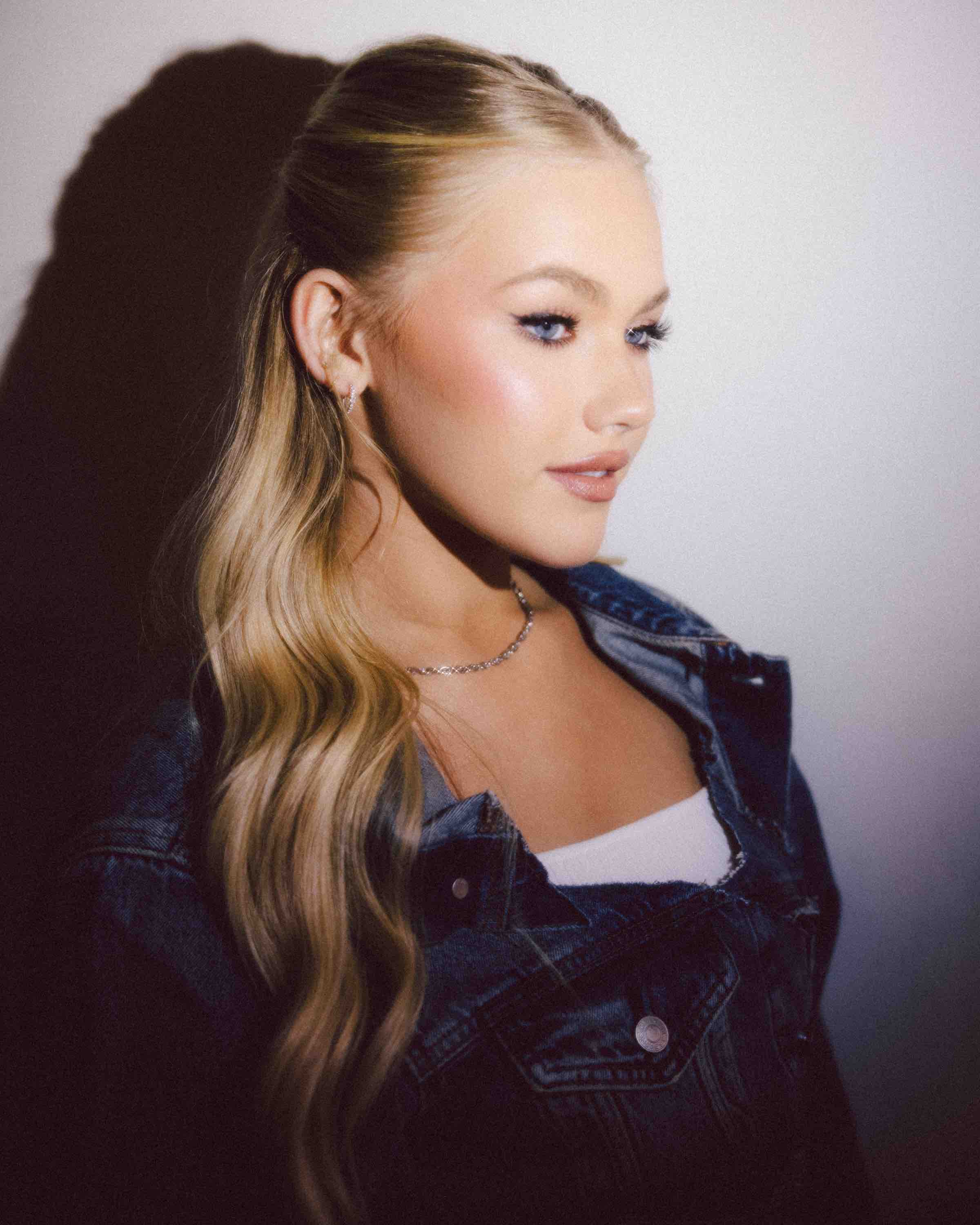
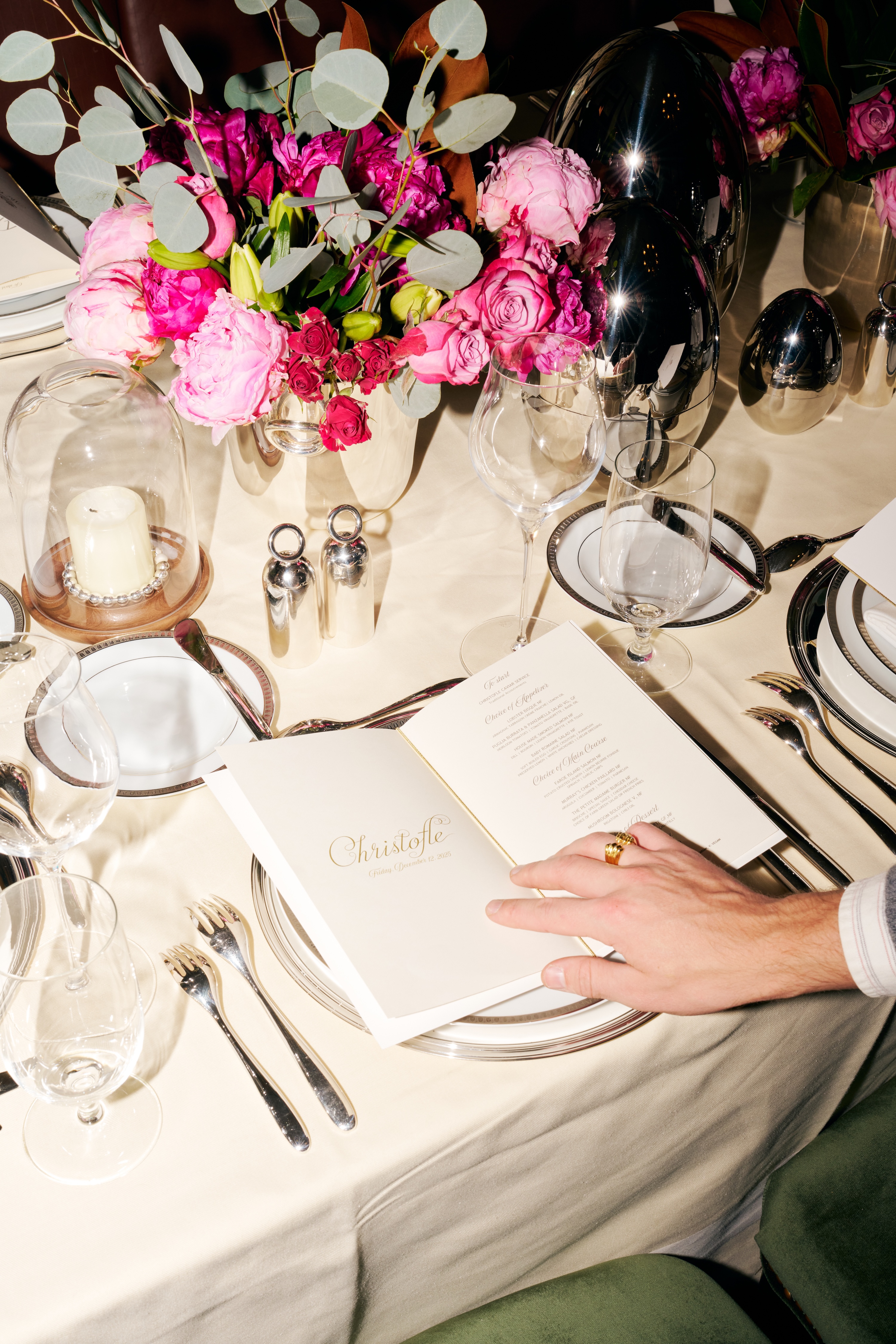
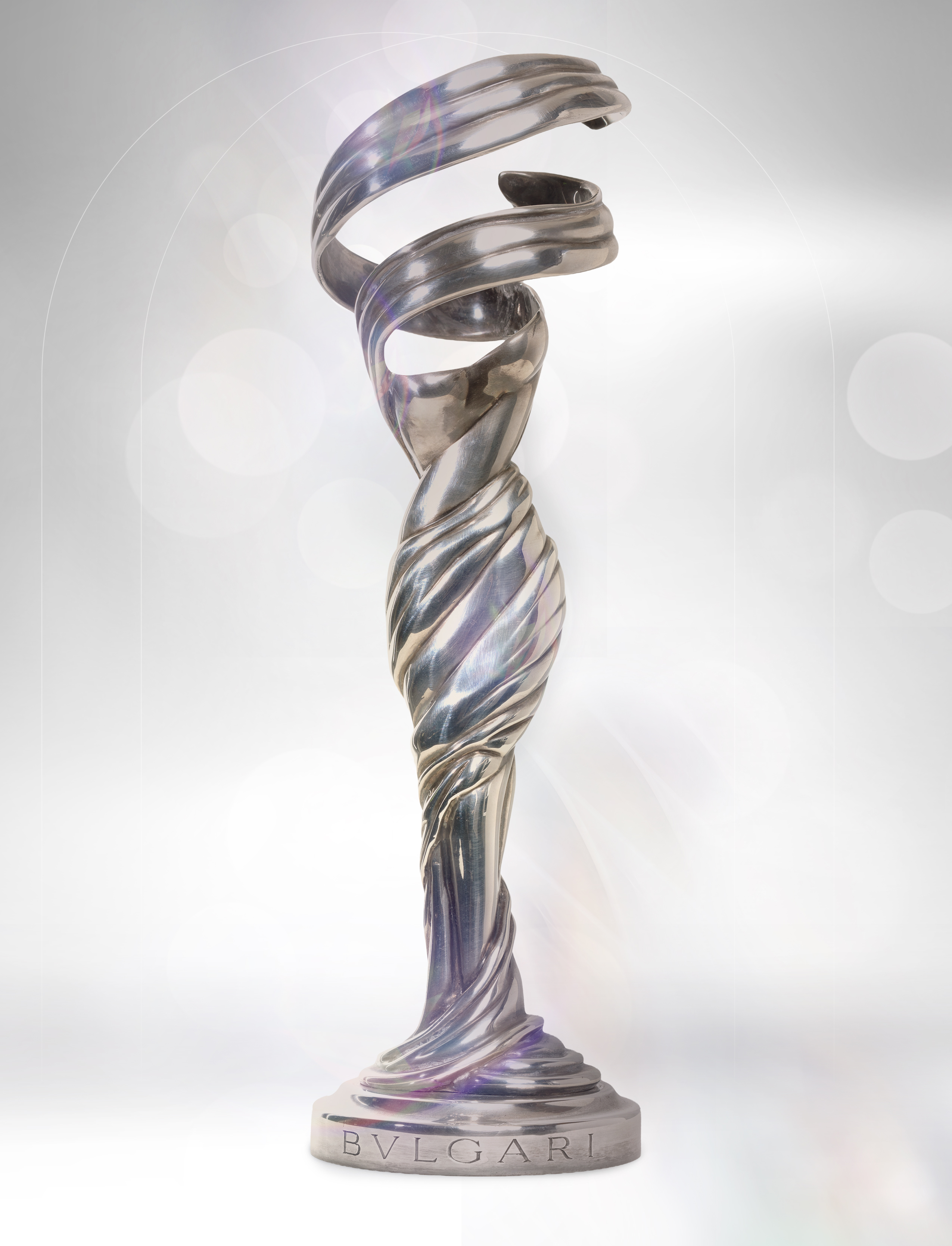
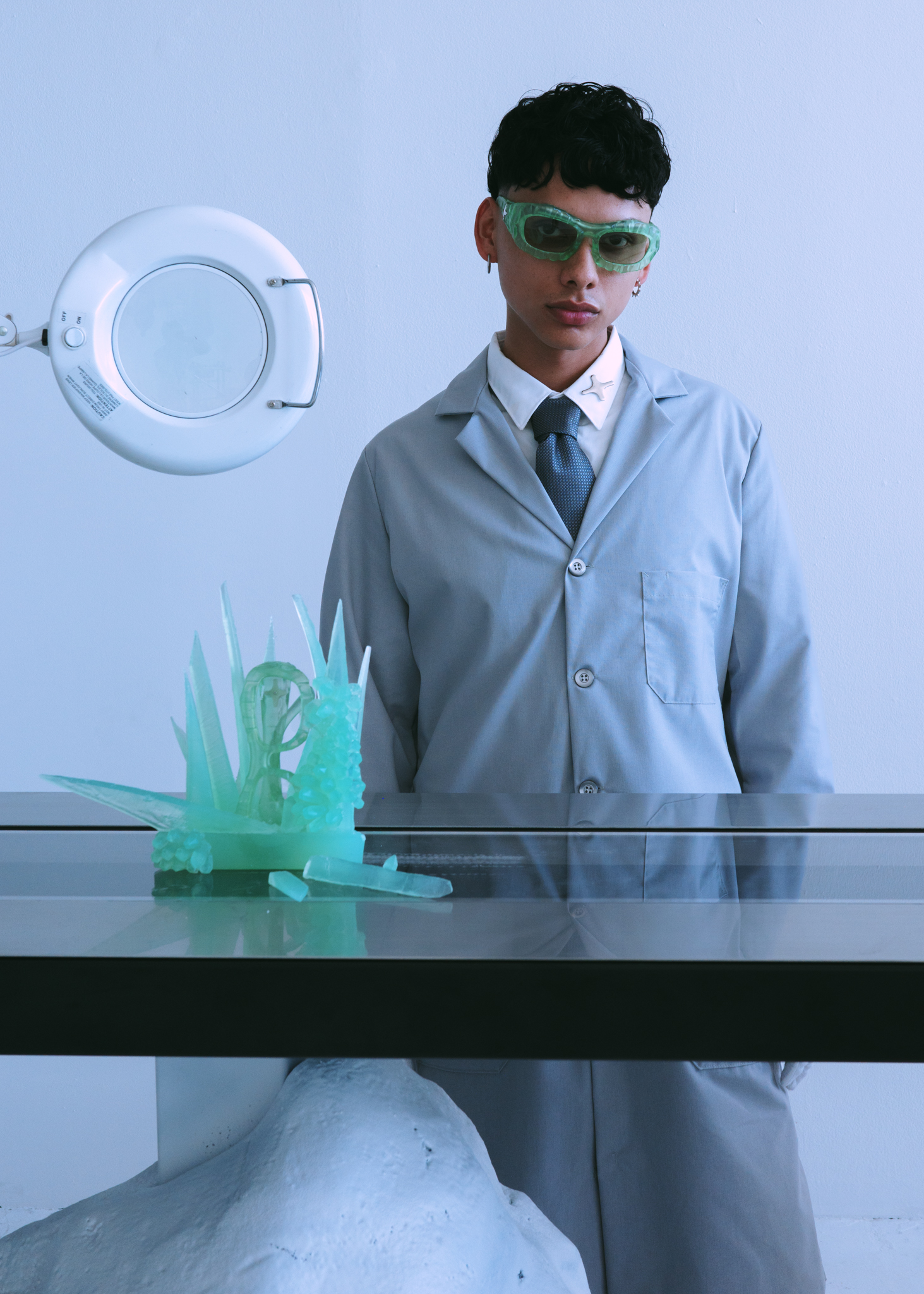
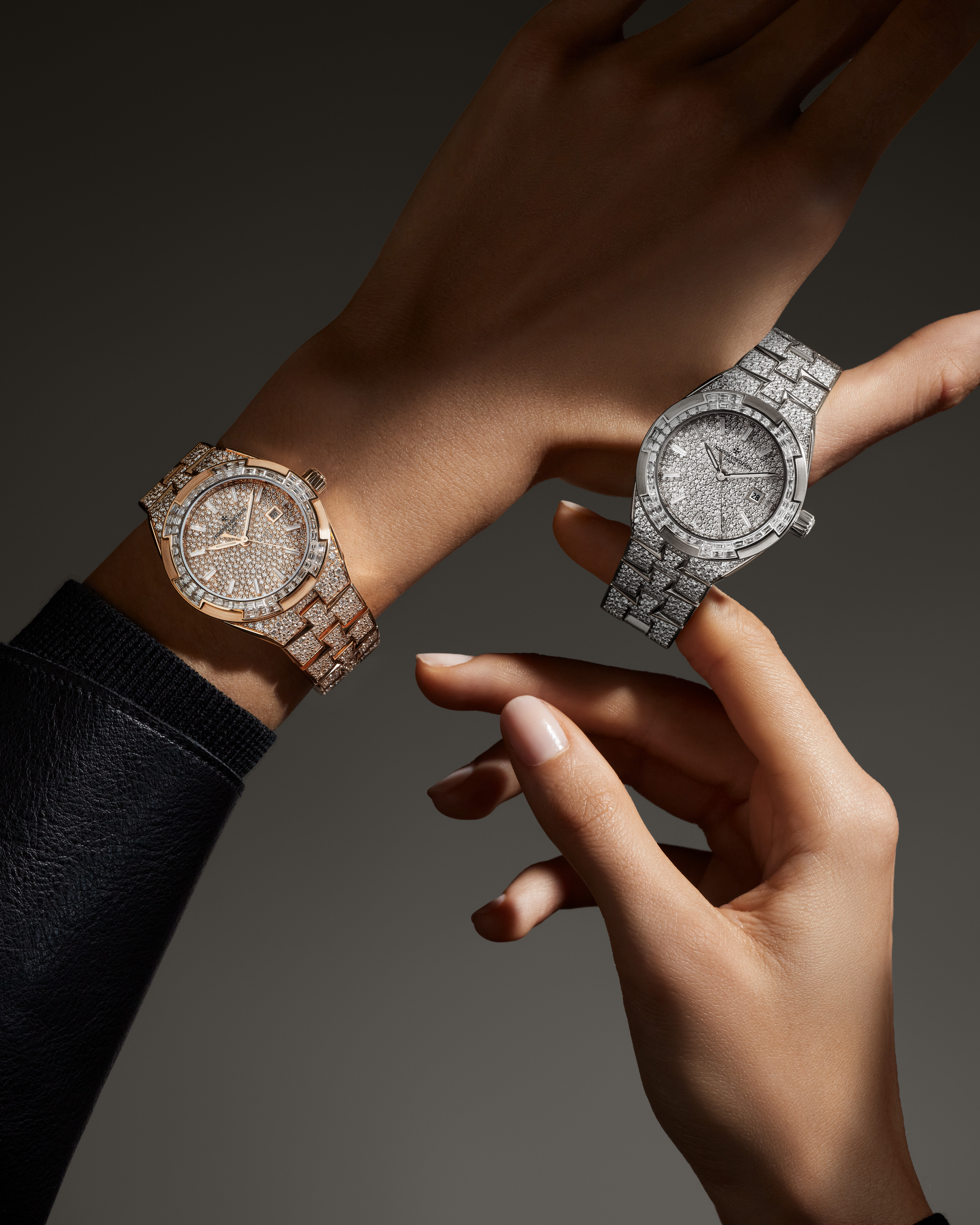
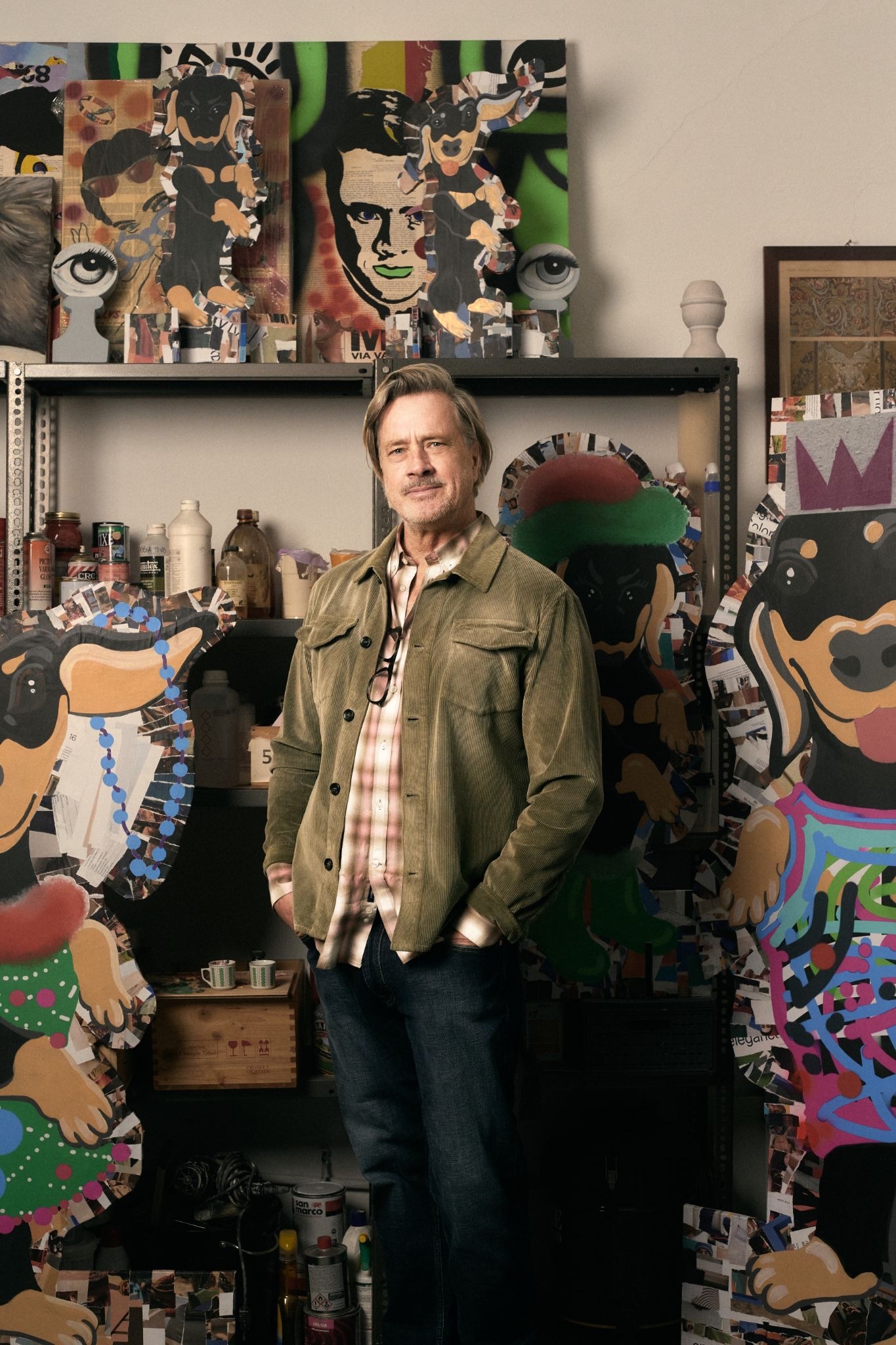
.JPG)
.jpg)
